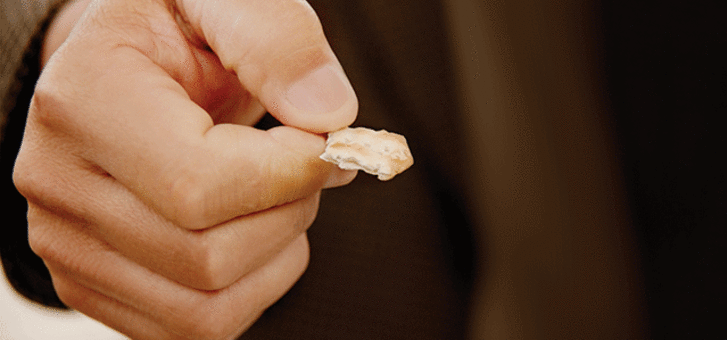Whenever I see a packet of Maltesers, I think of her. I was nine years old and in good health. She was legally blind, hard of hearing and bedridden in the retirement home where she lived.
My parents had taken the family to the United Kingdom that summer to meet a side of the family we children had never before seen, and also to give themselves the opportunity to catch up with friends from when they were younger.
Among them, I remember Miss Godden well. Not just because my parents obviously had a fond regard for her, but because, despite her failing health, she was bright and cheerful and especially happy to see us kids.
We visited her twice on our trip and both times she had arranged for packets of lollies to be purchased for us. I remember thinking as she gave them to us how amazing it was that she had done that when she was not well and that it really should be us doing nice things for her.
The treat she gave me was a packet of Maltesers. It was the first time I had tried them and I thought they were the best treat ever. To this day, whenever I see Maltesers®, I think of the frail, little old lady who was thoughtful enough to buy them for me.
Memory Triggers
Food is often associated with an event, an experience, a tradition or a person. Writer Kristen Anderson observes, “Because the experience of eating touches all of our senses, our brain is immediately triggered when we encounter food that smells, tastes, looks or feels the same way we remember. Within seconds we can visualise with whom we ate the food (or we may feel sadness at the memory of who was absent), we can smell the sea air, we can hear the city traffic or we can feel someone’s hand holding our hand.”
Perhaps it was for this reason that Jesus, on His last night with His disciples, chose to provide an experience involving food by which they (and we) can remember Him.
At that time, Jesus had been in public ministry for more than three years. His work on earth had been to show the world what God is like. He freely forgave people of their sins and spent time relieving their physical sufferings and grief. He was not too busy to spend time with children and He took the time to talk with individuals about things that were on their hearts. He took time to show that He cared about people.
As He neared the end of His public ministry, Jesus was fully conscious that there was one part of His work that He had yet to complete. On that last night before His death, He warned His disciples of what was about to happen: “I will be with you only a little longer,” He said. “You will look for me, and just as I told the Jews, so I tell you now: Where I am going, you cannot come” (John 13:33).
Jesus continued the discussion by reassuring His disciples, “Do not let your hearts be troubled. Trust in God; trust also in me. In my Father’s house are many rooms; if it were not so, I would have told you. I am going there to prepare a place for you. And if I go and prepare a place for you, I will come back and take you to be with me that you also may be where I am. You know the way to the place where I am going” (John 14:1–4).
Jesus gave His disciples an indication of what was about to happen but they didn’t fully grasp it. Knowing this, He was anxious that they remember His words that night. Matthew tells the story: “While they were eating, Jesus took bread, gave thanks and broke it, and gave it to his disciples, saying, ‘Take and eat; this is my body.’"
“Then he took the cup, gave thanks and offered it to them, saying, ‘Drink from it, all of you. This is my blood of the covenant, which is poured out for many for the forgiveness of sins’ ” (Matthew 26:26–28).
It must have been a strange thing for the disciples. What did Jesus mean by “This is my body”? And what did He mean by “This is my blood . . . poured out for many for the forgiveness of sins”?
Understanding Dawns
The following day, Jesus was nailed to a cross and died, condemned as a common criminal. And it wasn’t until after His resurrection that His disciples began to understand that His death on the cross was the crowning achievement of His work on earth—that it was through His death that humanity could be forgiven and reconciled to God.
Forty days after Jesus’ resurrection, He was with His disciples on a mountain. The first chapter of the book of Acts records the final moments that He spent with them. As He was giving them words of encouragement and instruction, “He was taken up before their very eyes, and a cloud hid him from their sight."
“They were looking intently up into the sky as he was going, when suddenly two men dressed in white stood beside them. ‘Men of Galilee,’ they said, ‘why do you stand here looking into the sky? This same Jesus, who has been taken from you into heaven, will come back in the same way you have seen him go into heaven’ ” (Acts 1:9–11).
A Promise To Remember
The experience of living, working and walking with Jesus revolutionised the lives of the disciples. For years after that, they would have talked about that final night with Him when He gave them the bread and wine by which to remember Him.
While the apostle Paul wasn’t present at that last supper, after his conversion, he wrote to his Christian friends in Corinth about what Jesus had said to His disciples on the night before He died and how He had told them to remember Him through the use of the bread and wine (see 1 Corinthians 11:23–25).
The commemoration of Jesus’ last night before His crucifixion is a reminder that He has died, that His body was broken, and that His blood was spilled as an atonement for our sins so that we might have eternal life.
That last supper Jesus had with His disciples also reminds us of His promise that He will return some day and take us back to be where He is—in heaven.
Jesus had promised, “I tell you, I will not drink of this fruit of the vine from now on until that day when I drink it new with you in my Father’s kingdom” (Matthew 26:29). The disciples reminded each other of this whenever they met together. Paul wrote that “whenever you eat this bread and drink this cup, you proclaim the Lord’s death until he comes” (1 Corinthians 11:26). This is another reason why Christians today celebrate the Lord’s Supper (or Communion, as it is now known) in churches around the world.
Communion reminds us of Jesus’ death that is past and it also reminds us of a hope for the future. It is a promise that’s full of joy and hope—joy that we can be free from sin and eternal death because He died in our place, and hope that He will return and take us back to be where He is.
Personally Speaking
It’s easy to let the Communion become just another religious ritual. But it’s much more than a mere ritual. It’s an experience that I look forward to.
The church I attend commemorates Communion just four times a year. Sometimes this happens during the main church service, while at other times we celebrate it in a more casual Friday night setting, sitting on cushions, with unleavened bread and unfermented wine laid out on a tablecloth or low table.
Sometimes, in a smaller group at someone’s house or even around a campfire, we have a meal first followed by a conversation about what Jesus did for us and then we partake of some bread and grape juice.
I never get tired of hearing that Jesus died for my sins and that I’m included in the many for whom He poured out His blood for the forgiveness of sins. I always come away grateful and full of hope in a life both here and now and also the promise of a future life with Jesus, when He will come again and take us to be where He is—just as He promised.




